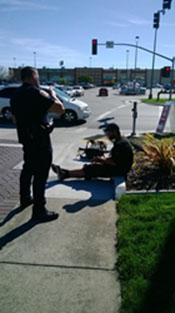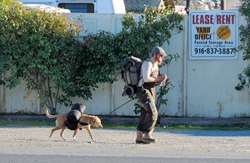Trouble on the Tracks
by Scott Thomas Anderson
The Press Tribune
Editor’s note: The Press Tribune was with Roseville Police Officer Dave Flood during his contacts with all individuals mentioned in this story.
|
Exactly one year ago, John Alpert set off on an expedition to see America’s open fields and lifting mountains,
along with its barest, white-knuckle modes of living in the
shadows. Like many young people drawn to train-hopping, the
19-year-old wanted to discover a new side of himself and the
nation somewhere on the most extreme edges of freedom. When Alpert climbed onto his first freight car at the beginning of March 2013, he thought he was temporarily stepping away from a college career, loyal friends and a worried, loving mother. He was sure he’d be back soon. |
|
In just one year that story has morphed into a grim tale
muttered around concealed barrel fires across the western U.S.
— “the college kid” from down south who was murdered in a
rail-rider’s camp in Roseville. A Press Tribune investigation has found that, while Alpert’s killing and other switchyard homicides are known among groups of travelers, the prospect of danger has done little to dampen the allure around train-hopping. |
|
| The Roseville Nexus | |
|
It’s a warm, winter morning in Roseville Square as police
officer Dave Flood approaches a man panhandling at the
windows of cars coming out of the shopping center. Allan
Havercamp, 36, is a train-hopper: With a dusty, sky-burnt
complexion and a towering Army backpack, Havercamp holds
up a cardboard sign that reads, “United States Drifters Core: Parasites Never Die!” The sign has the coded insignia of boxcar transients on its corner — a hidden message to anyone who speaks the language. Havercamp is originally from Texas. By his own reluctant account, the rails have already taken him from New York to Florida and beyond. Havercamp inhabits a multi-faceted world on the tracks, one peopled with young thrill-seekers and untraceable criminals alike: Not telling the difference between the two is believed to have cost Alpert his life. |
|
|
During Havercamp’s meeting with Flood he shares little of his
real background with the officer. Havercamp was illegally
panhandling according to the city’s codes, and so tries to
stay silent and get out of Roseville Square as quickly as
possible. Flood chats calmly with the drifter as he runs his
status through dispatch. In the last four years, Flood has
had more interactions with train-hoppers than most police
officers will have in an entire career. Flood has seen some common patterns. |
|
|
“I’m guessing you did a few years in the service, and then got
out and had a decent job for awhile,” Flood comments to
Havercamp. “And then something in happened in your life —
maybe the death of someone close to you — and it just changed your whole trajectory.” |
|
|
Crouched on the curb, the hopper looks up into the blinding daylight and nods his head. “You’ve got a pretty keen sense,” he mumbles. |
|
|
With one of the largest railroad switchyards in California, Roseville continues to see men, women and teens that’ve been on a similar journey as Havercamp wandering through its streets, usually with large backpacks, grimy clothes, bandanas, walking staffs and hungry, trailing dogs. Though John Alpert — along with transient John Owens back in 2001 — was killed near Roseville’s rail yard, those legacies aren’t keeping “travelers” from getting off trains in the same spots. |
|
|
Investigation Presses On |
|
|
On March 15, John Alpert’s family will hold a candlelight vigil for him in his hometown of Palmdale, marking the best estimate of the day he met his final fate. |
|
|
Roseville police detective Vince Dutto is the primary investigator tasked with finding and arresting the suspects involved. In the last year he’s engaged in deep research into the lifestyle of train-hoppers, as well as the loosely-organized “gangs” that exist on America’s rail lines. While the Freight Train Riders of America, or FTRA, are believed to have killed more boxcar transients than any other group across the western states, newer and much younger groups such as the Wrongway Kids and the Crusty Punks have also been implicated in criminal activity. |
|
|
Separate from so-called train gangs, random drifters are common
along the rails. On March 16, 2012, 25-year-old Kevin
Stratton was reportedly murdered along the train tracks in
Yuba County. His body was discovered along Arboga Road by
Union Pacific Railroad workers. While authorities have
mentioned no ties between Stratton and John Alpert, Dutto
says that, in Alpert’s case an arrest is still very possible due to evidence that’s been gathered and witnesses that have come forward. |
|
|
“From the day we caught this case we’ve never stopped working on it,” the detective observed. “The work has been constant — it’s always been on the front burner. Despite the inherent challenges, we’ve made real progress, including locating witnesses and zeroing in on persons of interest. That said, we believe there are more people out there with knowledge of what happened and we’re looking for them. The bottom line is we still have good leads.” |
|
| A Murder Remembered |
|
|
|
In an empty drainage trench off March Road, train-hopper Charles George Williams lays in the grass reading Jeffrey Archer’s novel, “Kane and Able.” If there’s any irony in holding a tome with a biblical allusion to one brother beating another brother to death, while at the same time resting less than a mile from where Alpert was killed by “massive blunt force trauma,” it doesn’t seem to register with Williams as he swigs on his cheap 40-ounce bottle of beer. Flood pulls up in his patrol car. Williams is trespassing, so the officer has him climb out of the weedy ditch-line with his I.D. in hand. As the two come face-to-face, they’re standing within view of a patch of dense forest that transients call “the jungle.” Beyond its treetops is an arrangement of massive concrete cylinders that have become Roseville’s newest train-hopper camp. Police describe each unit as a clean, coffin-sized mini-apartment for transients. The traveling community refers to this new camp as “the Tubes.” |
|
Flood asks Williams, who’s originally from Virginia, where he’s headed next. “I was just trying to get over to the underpass,” the young man says, referring to farther campsite just beyond Roseville’s borders. “Yeah, there’s a bunch of train kids down there right now,” Flood responds. “Is that guy who has the word ‘horse-s***’ tattooed across his face still there?” Williams asks. “No,” Flood replies. “I didn’t see him.” |
|
|
After checking to make sure Williams is clear of arrest
warrants, Flood begins to ask if he’s heard about Alpert’s
murder. At first Williams is confused and thinks Flood is
mentioning a different rail-rider who was killed — a young man
Williams only knew by the nickname, Clutter. Rumors abound in
the train-hopping culture that Clutter was thrown off a freight
car running at a high speed.
“My friend Hobbit had been riding with Clutter right before he
was killed,” Williams says. “The U.S. Marshals came and talked
to Hobbit about it, because they wanted to know what happened.”
“Do stories like that worry you?” Flood inquires.
“Naw,” Williams quips. “’Cause, I’ll tell you, I wouldn’t ride with no one who’d throw me off a moving train.”
Flood returns to his original question about John Alpert. “He was killed just down the road from here,” the officer says.
“Oh, that college kid from down south,” Williams replies
eagerly. “Yeah, I know that story. I mean, information gets
around, you know. I don’t know anything specific, but I definitely heard about it out there.”
Williams goes wandering away, strolling towards a nexus where the rail line crosses into Sacramento County.
During the same afternoon, Flood walks into an underpass where
five male train-hoppers are lounging around in torn, muddy
clothes. They have three dogs watching the officer
restlessly. Flood strikes up a conversation with the group,
eventually coming to the topic of whether they have heard of
John Alpert. All five of the young men, while they don’t know
Alpert’s name, have heard of the college kid from southern California who was killed in Roseville.
Flood asks if the murder is weighing on the train-hopper
community. One boxcar veteran, who only gave his name as
Brian, did not think it was. “Everyone heard about that killing,” Brian reflects. “But honesty, I think everyone’s forgotten about it now. We lose friends everyday — we lose them to trains, to overdoses, to cars, to getting old. Obviously whoever (killed Alpert) isn’t talking about it.” |
|




